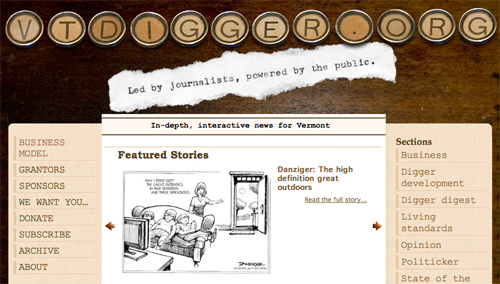
Anne Galloway didn’t know anything about nonprofits or websites when she was laid off from Vermont’s Times Argus last January. She once believed the web was more distracting than resourceful. But a layoff has a funny way of upending your perspective, and now Galloway sits at the helm of her own nonprofit news site.
Galloway launched VT Digger in September 2009 with designs on filling a coverage gap in her home state of Vermont. Take a look through the offerings and you’ll see much of the content reads like the nitty-gritty stuff that used to grab column inches. That’s the point. During months of pre-launch interviews and research, Galloway concluded that the demand for enterprise reporting isn’t being met by the reduced staffs of Vermont’s newspapers.
VT Digger isn’t a hobby or a side project. Galloway is all in. She works full-time on the site, often starting at 4 a.m. and finishing up well after dinner. When I talked to her, she had just settled in at the Vermont statehouse. She’s commuting 45 minutes each way while the legislature is in session.
On the content side, Galloway tries to post 5-7 pieces a week. That’s a tough task for what’s basically a one-person operation. It’s made harder by the time-intensive nature of her content, which often requires interviews and background research. But in a savvy bit of efficiency, she’s boosting coverage by dialing back her editorial filter. That’s not to say she’s posting shaky articles. She’s just letting readers parse information for themselves.
Here’s an example: In November, Galloway received a state memo outlining proposed school budget changes. Instead of cranking out a piece that hit the high points, she simply posted the text. “I decided I didn’t need to write a story about this,” she said. “People can judge for themselves. That saves me time, but it also enables me to say to our readers, ‘Look, we know you’re smart.'”
The benefits of putting it out there
Galloway spent considerable time pitching her business plan to prospective investors and picking the brains of nonprofit trailblazers, like Paul Bass from the New Haven Independent. Those meetings helped her assemble a board of advisors.
Galloway credits grunt work with pushing her through the reticence that blocks would-be entrepreneurs. “It’s hard to put yourself out there,” she said. “I’m able to talk about this semi-coherently because I’ve spent months talking to people about it. I’ve been perfecting the ideas and the language.”
Of course, there’s a moment when intense preparation becomes a detriment: The wheels spin but you don’t go anywhere. “At some point I said ‘I think I just need to do this,'” she recalled. “I don’t want to spend more time thinking about it and writing plans.”
Just doing it (apologies to Nike) is part of a mindset often found in smart online startups. These organizations know that the act of launching something — anything — is liberating because it turns theory into practice. Galloway experienced this herself. VT Digger’s first iteration was important because it existed outside of a business plan, which allowed it to become a tangible reference point for readers and potential donors. “It’s much easier for people to see what it is we’re trying to accomplish because we’re able to put new elements out all the time,” Galloway said.
Also in the tradition of smart startups, VT Digger got refreshed quickly. A recent redesign smoothed out the edges and gave Galloway access to web-based donations. That mechanism has already proven fruitful, with a December donation push bringing in $400 to $500. Combined with an assortment of gifts and grants, VT Digger’s current tally stands around $21,0000. There’s a long way to go before Galloway hits the $75,000 to $125,000 she’s hoping for, but it’s a start.